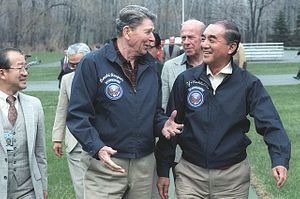Eisenhower. Nixon. Reagan. All three statesmen have been seen as representing peerless American leadership in tumultuous times abroad and at home. As astute strategists, they possessed contextual intelligence – the ability to discern trends in the face of complexity as well as adaptability while trying to shape events. The GOP foreign policy record could portend how a future Republican foreign policy might evolve.
In the 2004 presidential race, then-U.S. Senator Chuck Hagel reminded the nation of what U.S. leadership represents:
“A wise foreign policy recognizes that U.S. leadership is determined as much by our commitment to principle as by our exercise of power. Foreign policy is the bridge between the United States and the world, and between the past, the present, and the future. The United States must grasp the forces of change, including the power of a restless and unpredictable new generation that is coming of age throughout the world. Trust and confidence in U.S. leadership and intentions are critical to shaping a vital global connection with this next generation.” (Foreign Affairs 2004)
Hagel further outlined seven principles of a Republican foreign policy: The U.S. must 1) remain committed to leadership in the global economy; 2) not ignore global energy security; 3) recognize that long-term security interests are connected to alliances, coalitions and international institutions; 4) support democratic and economic reform; 5) prioritize relations with the western hemisphere – Canada and Latin America; 6) work with allies to combat poverty and the spread of disease worldwide; and 7) engage in strong and imaginative public diplomacy. Hagel also emphasized that U.S. relations with the European Union, Russia, India, and China would be vital to global security and stability. Three out of four of these relationships are in Asia. How might GOP candidates refashion the rebalance, Republican style?
Campaigning necessitates that candidates repudiate an incumbent’s record and differentiate themselves from other contenders. In ratcheting up rhetoric on national security, highly charged issues, such as China, may be useful for campaign stumping, but less so for elevating the Asia policy debate. At a Council on Foreign Relations symposium on U.S. Rebalance to Asia held earlier this week, Daniel Russel, Assistant Secretary of State for East Asian and Pacific Affairs, cautioned against the “politics of China” in the 2016 presidential campaign. Republican candidates might consider three elements in appropriating the rebalance within a Republican foreign policy rubric:
Past as Prologue. History explains. Legacy defines. Vision leads. In the arc of post-September 11 history, each candidate will likely craft respective narratives on how the past is a prologue to a future Republican foreign policy. Beyond critiquing the current White House and a hypothetical Hillary House, spelling out lessons learned from George W. Bush’s foreign policymaking will add depth and dimensionality to the debate. Jeb Bush, in particular, bears the burden of delineating his leadership identity from the legacies of his father and brother. Defining what it means to be “his own man” presents a unique opportunity to describe how a Bush 3.0 administration would be distinctly different. Mapping out the path from the past to the present is critical to framing the future of U.S. leadership in Asia, the fulcrum of global economic and geopolitical competition and cooperation. “If this rebalance is for the ages, then we need to hear from [U.S.] presidential candidates; they need to show they are committed to the rebalance,” opined Michael Fullilove, Executive Director of the Lowy Institute for International Policy.
Principle Plus Power. High-voltage focus on foreign policy from 19 GOP contenders at the Republican Leadership Summit in New Hampshire this past weekend affirmed that the candidates’ national security narratives are still a work in progress. Rand Paul took swipes at GOP hawks for military overdrive. Beneath the bluster notwithstanding, his point speaks to a fundamental issue of whether principles will underpin a potential Republican president’s exercise of power. In the words of Yale historian John Lewis Gaddis, “It is always a bad idea to confuse power with wisdom: muscles are not brains.” The Iran nuclear deal has ramifications for Asia just as much as it does for the Middle East. While war-weary Americans recognize that myriad national security threats are on the horizon, the next president’s justification for U.S. military intervention will require a wise approach to the use of hard power as a reflection of principled American global leadership.
Packaging “Chipotle” Politics. Politics speak with symbols. Much ado about Hillary’s soft launch dissected her symbol-laden roll-out. The Hillary logo, burrito bite at Chipotle, Scooby van, campaign video, and drive-by coffee chin-wags served to humanize Hillary as an everyday American – a “common touch” connection with constituents. Asian mastery of symbols is sophisticated. Wielding the power of symbolism is a civilizational art, diplomacy device, and communications tool. Republican candidates should hone their own brand of symbolism on the campaign trail. China is proactively burnishing its image as a global power via grand-scale symbolism. A savvy U.S. presidency will avoid White House protocol blunders such as those committed during the 2006 visit of China’s former president Hu Jintao. Symbolism savoir-faire is a critical component of soft power that facilitates trust-building and shapes perceptions.

































